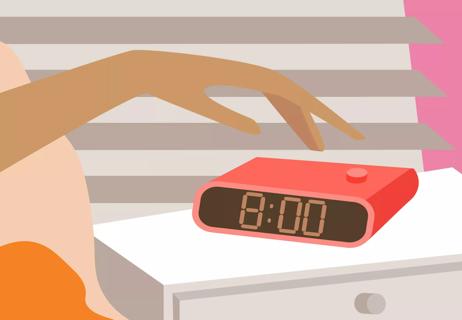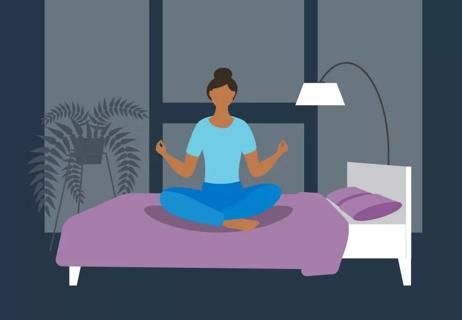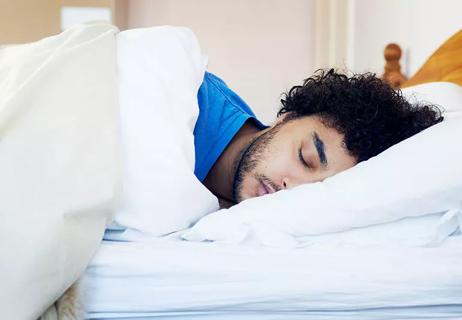Tips for readjusting your sleep cycle

(Yawn). Does your sleep cycle have you out of step with the rest of the waking world? If you find yourself regularly going to bed earlier in the evening and waking up long before sunrise you may have advanced sleep phase disorder.
Advertisement
Cleveland Clinic is a non-profit academic medical center. Advertising on our site helps support our mission. We do not endorse non-Cleveland Clinic products or services. Policy
With this condition, the hands of your “internal clock” move backward, creating short evenings and unusually long mornings compared with most people.
You may still get enough sleep, but problems can arise when you can’t stay awake for evening activities that you enjoy.
We talked with sleep disorders expert Colleen Lance, MD, about how this condition works ― and when and how doctors may treat it.
A: If a person normally sleeps from about 10 p.m. to 6 a.m., advanced sleep disorder would change that so they may fall asleep as early as 6 p.m. and wake up at 2 in the morning. Their total amount of sleep and its quality is normal, as is their function during the day, but their clock shifts backwards.
A: We typically see it in the older populations where someone doesn’t get enough exercise or stimulation so they start to fall asleep earlier and earlier at night. But about 1% of middle-aged adults have advanced sleep phase disorder too.
A: It can start inhibiting your social life when you want to go out with friends and have dinner or see a play, for instance. It might even make driving dangerous because it becomes your regular sleep time.
A: Often an environmental change. Someone may go to a nursing home and they don’t have their normal cues and activity.
Advertisement
Also, light is one of the strongest stimulants. If you take someone from a place like Texas with longer days and lots of sunlight who moves to the north with shorter days, they may go to bed much earlier than they did previously.
A small percentage of people have a genetic predisposal to it as well. If they have a particular gene that runs in their family, just about all of their relatives go to sleep early.
A: First, we want to make sure there isn’t something going on that might mimic the disorder. People may fall asleep early because of something else, like depression, alcohol use or sleep apnea. Or they may nap during the day, which makes them wake early in the morning.
So, we screen for depression and mood disorders, eliminate daytime napping or treat them for sleep apnea. If none of those are the cause, we assume it’s the disorder.
A: The mainstay of therapy is light exposure. Using a bright light box for 30 to 60 minutes in the early evening hours can help push that internal clock ahead. Evening light exposure and limiting light in the morning when you wake up helps shift things.
A: The treatment is very effective, but we do have to be careful with some people.
An ophthalmologist would have to approve treatment for someone with a retinal disorder because it can damage the eyes. Light exposure can also lower the threshold for seizures in those with seizure disorder. And it can sometimes set off manic episodes for someone who has bipolar disorder.
If you feel like your sleep schedule is out of whack, talk to your physician. They can help sort out what’s going on and whether you need treatment.
Advertisement
Learn more about our editorial process.
Advertisement

Pain, light exposure and anxiety are just a few factors that could be waking you up in the middle of the night

If you’re feeling short of breath, sleep can be tough — propping yourself up or sleeping on your side may help

Changing hormones, mental health issues and a higher risk for sleep disorders can all impact women’s sleep needs

Stress, alcohol, sleep apnea and (you guessed it!) scary movies are a few common causes of bad dreams

This social media sleep hack with tart cherry juice and magnesium could be worth a try

It’s normal to oversleep occasionally, but sometimes, there might be an underlying cause

Tame racing thoughts with breathing exercises, screen time limits and connecting to your body

The scoop on sleep supplements and sleeping pills

Wearing a scarf, adjusting your outdoor activities and following your asthma treatment plan can help limit breathing problems

Your diet in the weeks, days and hours ahead of your race can power you to the finish line

When someone guilt trips you, they’re using emotionally manipulative behavior to try to get you to act a certain way